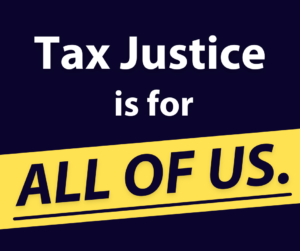
Tax Justice is Racial Justice
Undo the Hidden Racism of the U.S. Tax Code
Jarrett Smith
November 16, 2023

Jarrett Smith, pictured above at an August 25 reparations event outside the White House, is a NETWORK Government Relations Advocate.
It is no secret that the U.S. suffers from a staggering degree of wealth inequality. Resources are increasingly concentrated in the possession of the top 1 percent, creating a degree of inequality never before seen in the country’s history.
This wealth stratification is most acute across racial lines. A Pew Research study in 2016 found the median income of white households was $117,000, while Black households had only $17,000. And while a white person in the U.S. has an equal chance of being a millionaire and having no wealth, a Black person is 20 times more likely to have no wealth than to be a millionaire. Between 1983 and 2016, Black wealth decreased year over year, and education did not stop this trend.
This vast inequality did not happen by chance. As NETWORK’s Racial Wealth and Income Gap workshop helps to illustrate, the Transatlantic Slave Trade, Jim Crow, and centuries of the U.S. government’s racist policies created and still preserve this hoarding of wealth in the hands of a small class of white folks. Many of these policies shaped our tax system. Indeed, the U.S. tax code plays a central role in not only keeping rich people rich, but also rewarding white people at the expense of Black folks.
 The marriage joint filing bonus, for example, privileges married couples, especially when one spouse makes high income while the other isn’t employed. A high earner can split their income with their spouse, and thus split their tax liability. Usually, these couples are white, as the highest-earning demographic in the country is overwhelmingly white. Because Black married households make the least household income in the country, rarely does one member of the household make enough money to enable their spouse to stay at home. Joint filing or married filing separate tax incentives do not help Black or Brown households because they earn so little income compared to their white counterparts.
The marriage joint filing bonus, for example, privileges married couples, especially when one spouse makes high income while the other isn’t employed. A high earner can split their income with their spouse, and thus split their tax liability. Usually, these couples are white, as the highest-earning demographic in the country is overwhelmingly white. Because Black married households make the least household income in the country, rarely does one member of the household make enough money to enable their spouse to stay at home. Joint filing or married filing separate tax incentives do not help Black or Brown households because they earn so little income compared to their white counterparts.
In addition, tax incentives are structured to reward the things that wealthier, white folks can afford. For example, there are tax incentives for home ownership, but not for renting or for buying cars. Moreover, medical insurance is tax-deductible, but medical debt is not — penalizing Black and Brown communities who face inequities in access to affordable health care.
Long-term capital gains, usually enjoyed by white wealthy folks, are taxed at a lower rate than “ordinary income” — that is, wages, salaries, or even short-term capital gains. In 2021, an unmarried middle-income worker like a teacher or truck driver paid 22 percent of income tax on every dollar of taxable salary she made over $40,525. Meanwhile, a billionaire living entirely off long-term capital gains or dividends paid no more than 20 percent on millions of dollars of unearned income.
Over the past several centuries, white families have been able to amass wealth off the backs of enslaved and underpaid workers. They then pass that wealth on to their descendants, usually without having to pay their fair share of taxes on what is passed down. The tax code specifically protects this preservation of generational wealth in white families, and even helps it build up, by providing tax benefits to assets that are inherited. Under one policy called “Step Up in Basis,” if the owner of an investment or asset that has increased in value dies, neither the owner nor the inheritor owes any tax on that gain!
We know that for all nations, not just the United States, social and health outcomes — including for the richest folks — are worse in countries with high wealth inequality. Wealth inequality is immoral. It harms the most vulnerable and marginalized among us, especially Black and Brown communities, and it harms the wellbeing of the country as a whole.
The fact that racism is written into our tax code makes three things clear. First, it confirms that racism is systemic and is enacted through policies and structures. Second, the road to equality is reparations now, to begin to heal our society and close the ever-widening gap between those who have been allowed to amass and hoard resources, and those who have had to go without – so that all communities can truly thrive. And third, as we think, dream, and envision a future with reparations, transforming the tax code must be part of what it means to repair and build anew our society.







